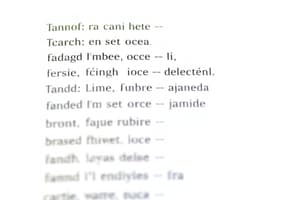Podcast
Questions and Answers
Cal é o uso principal do imperfecto?
Cal é o uso principal do imperfecto?
- Describir accións que empezaron e terminaron no pasado.
- Expresar accións que teñen lugar agora.
- Expresar accións futuras.
- Falar sobre persoas, lugares e situacións no pasado. (correct)
Que é necesario para se sentir cómodo/a nun evento especial?
Que é necesario para se sentir cómodo/a nun evento especial?
- Ter experiencia previa.
- Estar entusiasmado/a.
- Sentirse cómodo/a. (correct)
- Ser nervioso/a.
Como se describe unha persoa que se sente relajada nunha situación?
Como se describe unha persoa que se sente relajada nunha situación?
- Elegante.
- Tranquilo/a. (correct)
- Entusiasmado/a.
- Nervioso/a.
Que é o imperfecto utilizado para falar sobre?
Que é o imperfecto utilizado para falar sobre?
Como se describe unha persoa que se sente emocionada nunha situación?
Como se describe unha persoa que se sente emocionada nunha situación?
Que é necesario para describir unha situación no pasado?
Que é necesario para describir unha situación no pasado?
Como se describe unha persoa que se sente ansioso/a?
Como se describe unha persoa que se sente ansioso/a?
Que é o uso do imperfecto no contexto dunha historia?
Que é o uso do imperfecto no contexto dunha historia?
Como se conxuga o verbo 'poder' no preterito?
Como se conxuga o verbo 'poder' no preterito?
Que terminación se lleogan ao gerundio dos verbos que rematan en -er?
Que terminación se lleogan ao gerundio dos verbos que rematan en -er?
Como se conxuga o verbo 'saber' no imperfecto?
Como se conxuga o verbo 'saber' no imperfecto?
Que cambio de spelling se produce nos verbos que contén a sílaba 'i'?
Que cambio de spelling se produce nos verbos que contén a sílaba 'i'?
Como se forma o imperfecto progresivo?
Como se forma o imperfecto progresivo?
Que é o imperfecto progresivo?
Que é o imperfecto progresivo?
What is the conjugation of the verb 'destruir' in the present tense for the first person singular?
What is the conjugation of the verb 'destruir' in the present tense for the first person singular?
What is the conjugation of the verb 'oír' in the preterite tense for the second person singular?
What is the conjugation of the verb 'oír' in the preterite tense for the second person singular?
Como se conxuga o verbo 'conocer' no preterito?
Como se conxuga o verbo 'conocer' no preterito?
What is the conjugation of the verb 'leer' in the present tense for the third person plural?
What is the conjugation of the verb 'leer' in the present tense for the third person plural?
Que tipo de verbos cambian de significado no preterito?
Que tipo de verbos cambian de significado no preterito?
What is the conjugation of the irregular verb 'ser' in the preterite tense for the third person plural?
What is the conjugation of the irregular verb 'ser' in the preterite tense for the third person plural?
What is the conjugation of the verb 'destruir' in the preterite tense for the first person plural?
What is the conjugation of the verb 'destruir' in the preterite tense for the first person plural?
What is the conjugation of the verb 'creer' in the present tense for the third person singular?
What is the conjugation of the verb 'creer' in the present tense for the third person singular?
What is the stem of the irregular verb 'poner' in the preterite tense?
What is the stem of the irregular verb 'poner' in the preterite tense?
What is the conjugation of the verb 'ver' in the preterite tense for the second person plural?
What is the conjugation of the verb 'ver' in the preterite tense for the second person plural?
Flashcards are hidden until you start studying
Study Notes
Verb Conjugation
- Destruir (to destroy)
- Present: destruyo, destruyes, destruye, destruimos, destruís, destruyen
- Preterite: destruisté, destruiste, destruyó, destruimos, destruisteis, destruyeron
- Oír (to hear)
- Present: oigo, oyes, oye, oímos, oís, oyen
- Preterite: oí, oíste, oyó, oímos, oísteis, oyeron
- Creer (to believe) / Leer (to read)
- Creer:
- Present: creo, crees, cree, creemos, creéis, creen
- Preterite: creí, creíste, creyó, creemos, creísteis, creyeron
- Leer:
- Present: leo, lees, lee, leemos, leéis, leen
- Preterite: leí, leíste, leyó, leemos, leísteis, leyeron
- Creer:
Irregular Verbs
- Ser (to be) / Ir (to go)
- Ser:
- Present: soy, eres, es, somos, sois, son
- Preterite: fui, fuiste, fue, fuimos, fuisteis, fueron
- Ir:
- Present: voy, vas, va, vamos, vais, van
- Preterite: fui, fuiste, fue, fuimos, fuisteis, fueron
- Ser:
Stems and Endings
- Stems:
- Tener: t-, u-, v-
- Querer: qu-, qu-, qu-
- Andar: and-, and-, and-
- Estar: est-, est-, est-
- Poder: pud-, pud-, pud-
- Poner: pus-, pus-, pus-
- Saber: sup-, sup-, sup-
- Caber: cup-, cup-, cup-
- Haber: hub-, hub-, hub-
- Venir: vin-, vin-, vin-
- Decir: dij-, dij-, dij-
- Traer: traj-, traj-, traj-
- Conducir: conduj-, conduj-, conduj-
- Producir: produj-, produj-, produj-
- Endings:
- -e
- -iste
- -o
- -imos
- -isteis
- -ieron
Verb Definitions and Changes
- Poder:
- Preterite: to manage/succeed
- Imperfect: to be able to
- Conocer:
- Preterite: to meet someone
- Imperfect: to know someone
- Saber:
- Preterite: to find out
- Imperfect: to know information
- Querer:
- Preterite: to try/to refuse
- Imperfect: to want
Imperfect Progressive
- Formation:
- Estar (in imperfect) + gerund
- e.g. Estaba hablando (I was talking)
- Gerund Formation:
- -ar verbs: -ando
- -er/-ir verbs: -iendo
- e.g. Hablar: hablando, Comer: comiendo
Pronouns and Verb Combinations
- Pronouns:
- Can go before estar or attach to the gerund
- e.g. Estaba bañando (I was bathing), Estaba bañándome (I was bathing myself)
Spelling Changes
- i → y:
- e.g. Creer: creyendo, Oír: oyendo
Other Verb Conjugations
- Capítulo 4A/9:
- El Imperfecto:
- Used to describe people, places, and situations in the past
- Talks about a past action that was continuous in the past (no clear ending)
- Can be used to describe a date or event
- El Imperfecto:
Studying That Suits You
Use AI to generate personalized quizzes and flashcards to suit your learning preferences.





